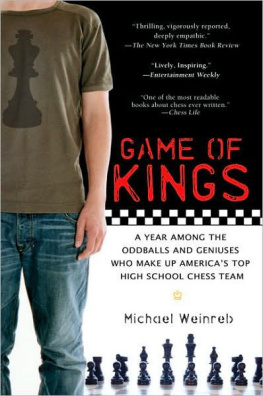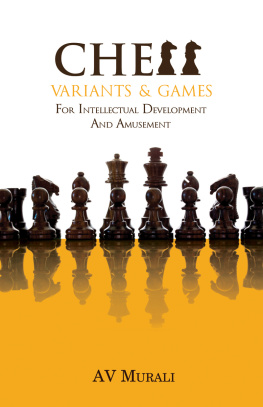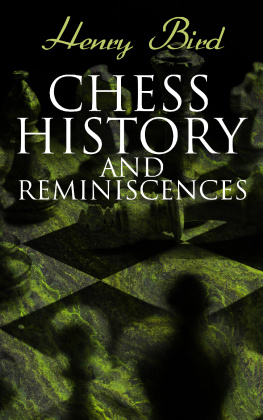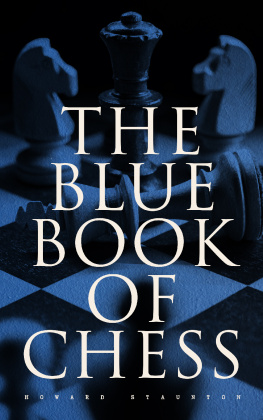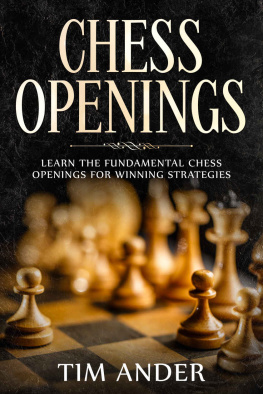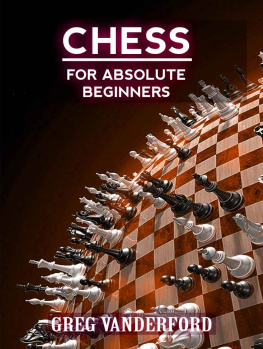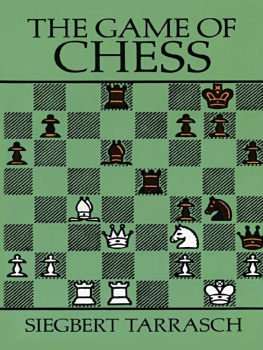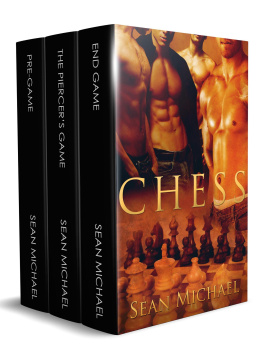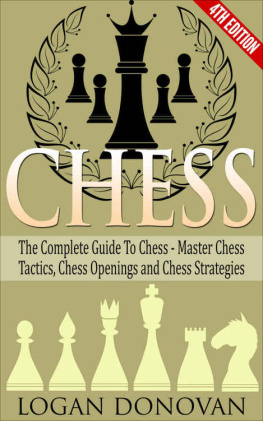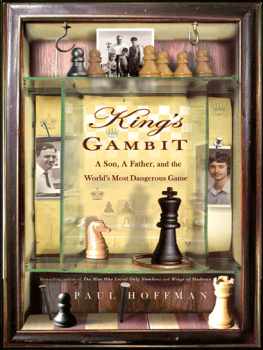Table of Contents
Praise for Game of Kings:
Lively, inspiring....With [Michael Weinrebs] vivid portraits and brisk narrative style, he manages to find high drama in a roomful of brilliant young minds pushing little pieces across a 64-square grid.
Entertainment Weekly
[Game of Kings] is supported by well-chosen detail, intelligence, and terrific writing. Weinreb clearly develops an affection for the eclectic members of his team, and because of the skill he brings to his project, so will his readers.
Publishers Weekly (starred review)
Compelling....Weinreb paces the action expertly....The seasons ebbs and flows intermingle with the prosaic details of inner-city adolescence to singularly lyrical effect. Kirkus
Entertaining. Newsday
Not only among the very best accounts written about chess, but also among the best nonfiction works 2007 has offered.
OK Gazette
Writing with the deft, propulsive style of a young Frank Deford, Michael Weinreb has captured both the intellectual insanityand the curious normalcyof what its like to be a teenaged super-genius. Game of Kings is the Friday Night Lights of high school chess.Chuck Klosterman, author of Sex, Drugs, and
Cocoa Puffs and Chuck Klosterman IV
Game of Kings is about chess in the same way that Darcy Freys The Last Shot was about basketball. Michael Weinrebs real subjects are the nature of talent, the onset of adolescence, and the kingdom of Brooklyn. This is a wonderful book.
Mark Kriegel, author of Pistol:The Life of Pete Maravich and Namath: A Biography
Michael Weinreb has done a heroic job doing something once thought impossiblemaking an eminently readable topic out of chess. Part Word Freak, part Season on the Brink, Game of Kings is a gripping inside look at an endearingly quirky subculture.
L. Jon Wertheim, author of Transition Game and Venus Envy
Game of Kings isnt so much a book about high school chess as it is an unforgettable journey into the blessing and curse of adolescent genius. With a narrative rich in voicea gathering of intoxicating charactersWeinreb has delivered nothing short of a generational classic. This is a stunning book. You wont soon forget it.
Adrian Wojnarowski, author of The Miracle of St. Anthony
Michael Weinrebs work has appeared in The New York Times, the Boston Globe, the Los Angeles Times, Newsday, and ESPN The Magazine. In his career as a journalist, he has been named best sportswriter in Ohio by the Associated Press, was nominated for a Pulitzer Prize, and has been cited three times in the Best American Sports Writing anthology. He lives in New York City.
GOTHAM BOOKS
Published by Penguin Group (USA) Inc.
375 Hudson Street, New York, New York 10014, U.S.A.
Penguin Group (Canada), 90 Eglinton Avenue East, Suite 700, Toronto, Ontario M4P 2Y3, Canada (a division of Pearson Penguin Canada Inc.) Penguin Books Ltd, 80 Strand, London WC2R 0RL, England Penguin Ireland, 25 St Stephens Green, Dublin 2, Ireland (a division of Penguin Books Ltd) Penguin Group (Australia), 250 Camberwell Road, Camberwell, Victoria 3124, Australia (a division of Pearson Australia Group Pty Ltd) Penguin Books India Pvt Ltd, 11 Community Centre, Panchsheel Park, New Delhi-110 017, India Penguin Group (NZ), 67 Apollo Drive, Rosedale, North Shore 0632, Auckland, New Zealand (a division of Pearson New Zealand Ltd) Penguin Books (South Africa) (Pty) Ltd, 24 Sturdee Avenue, Rosebank, Johannesburg 2196, South Africa
Penguin Books Ltd, Registered Offices: 80 Strand, London WC2R 0RL, England
Published by Gotham Books, a member of Penguin Group (USA) Inc.
Copyright 2007 by Michael Weinreb
eISBN : 978-1-592-40338-7
Without limiting the rights under copyright reserved above, no part of this publication may be reproduced, stored in or introduced into a retrieval system, or transmitted, in any form, or by any means (electronic, mechanical, photocopying, recording, or otherwise), without the prior written permission of both the copyright owner and the above publisher of this book.
The scanning, uploading, and distribution of this book via the Internet or via any other means without the permission of the publisher is illegal and punishable by law. Please purchase only authorized electronic editions, and do not participate in or encourage electronic piracy of copyrighted materials. Your support of the authors rights is appreciated.
While the author has made every effort to provide accurate telephone numbers and Internet addresses at the time of publication, neither the publisher nor the author assumes any responsibility for errors, or for changes that occur after publication. Further, the publisher does not have any control over and does not assume any responsibility for author or third-party Web sites or their content.
http://us.penguingroup.com
In memory of my uncle,
Mark Rosenbloom (1945-2005),
the first chess player I knew
The Murrow team with President Bush (from left to right): Congressman Anthony Weiner, Senator Charles Schumer, Alex Lenderman, Sal Bercys, Ilya Kotlyanskiy, President George W. Bush,Willy Edgard, Nile Smith, Oscar Santana, Olga Novikova, Dmitriy Minevich, and Eliot Weiss with his two children
PROLOGUE
FOUR DAYS AFTER CHRISTMAS, 2004, IN A PIN-DROP-SILENT HOTEL conference room with a panoramic view of a TGI Fridays and an adult bookstore, Oscar Santana nudges a black pawn forward, sweeps a white rook off the board, and presses the button atop his game clock with a faint click.
This is not chess, mutters the man on the opposite side of the board. His name is Norman, according to the pairings board at the Empire City Open, and Norman is regarding Oscar with a slack jaw and a pair of bugged-out eyes. Norman is also wearing a black winter cap indoors, as if to conceal from the outside world the strings that command his elastic facial features. This is not chess, Norman says again, and he is speaking far too loudly now, his voice piercing the white noise of ticking game clocks and humming air vents and muffled coughs.
Norman is approximately three times Oscars age, and a good half a foot taller, and his choice of headwear, coupled with his tics and twitches and grimaces and the plaintive noises he emits through his bulbous lips, lends him the appearance of a burglar trying to make an escape through a narrow air shaft. In truth, the board is shrinking on Norman; there are few safe places for his king to escape. His is, as they say in the sport, a lost game, and there is no worse feeling in chess than the realization that defeat is imminent and unavoidable.
Norman shakes his head and says something utterly incomprehensible. Oscar just sits there, stone-faced, a pair of silver headphones clapped over his ears, a tinny hip-hop beat creeping out from underneath. Then he moves his rook to Normans back row, to threaten his queen. The queen is the most potent piece on a chessboard, the only one capable of moving any number of spaces in any direction, horizontal, vertical or diagonal, and if the queen is crippled, if the queen is retreating instead of attacking... and especially when Norman is already down a rook, because only a pair of rooks can begin to approach the queen in terms of strength... and who the

